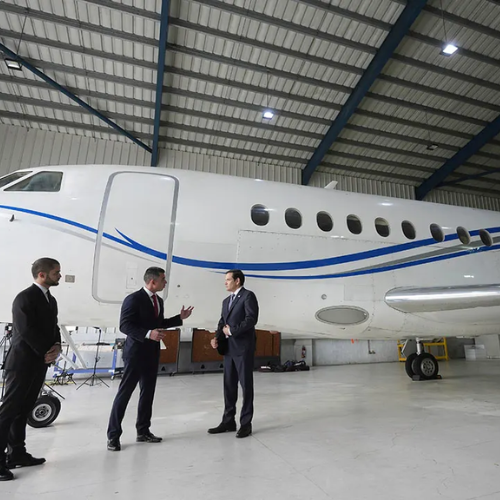In a significant move against the government of Venezuelan President Nicolas Maduro, U.S. authorities seized a second aircraft linked to Venezuela’s state-owned natural gas company. This Dassault Falcon 2000EX jet was taken in the Dominican Republic, marking yet another blow to the Maduro regime’s efforts to bypass international sanctions.
The plane belonged to Petroleos de Venezuela, S.A. (PdVSA), a state-owned oil and gas company already under strict U.S. sanctions. It was reportedly being used to sidestep U.S. laws and support illicit activities that benefited the Venezuelan government. Authorities revealed that the seizure happened during a visit to the Dominican Republic by U.S. Secretary of State Marco Rubio, who was meeting with the country’s president to strengthen regional cooperation.
How the Plane Violated U.S. Sanctions
This seizure is linked to a 2019 executive order aimed at punishing those who assist the Maduro regime. This order specifically banned American companies and citizens from doing business with PdVSA. The aircraft in question, bought in 2017 and registered under the tail number YV-3360, was being maintained using American-made parts. These included essential items like electronic flight displays, flight management computers, and brake assemblies, all of which were obtained in violation of U.S. laws.
Trump’s Reckless Tariffs Could Backfire, Forcing U.S. to Rely on Sanctioned Venezuelan Oil
Authorities explained that using U.S.-made parts to service planes linked to sanctioned entities is a breach of export control and sanctions regulations. The Justice Department’s National Security Division emphasized the seriousness of these violations, stating that they would not tolerate the use of American technology to assist sanctioned regimes.
A Pattern of Sanctions Evasion
This is not the first time a Venezuelan plane has been confiscated. In September 2024, a different aircraft, a Dassault Falcon 900EX owned by Nicolas Maduro himself, was also seized in the Dominican Republic. That plane was quickly flown back to the United States by Homeland Security Investigations (HSI).
Both planes were reportedly used for official purposes, including transporting high-ranking Venezuelan officials. One of these flights even carried a Venezuelan oil minister, who is also under U.S. sanctions, to an international meeting of oil-exporting nations. U.S. authorities said these planes highlight the Maduro regime’s ongoing misuse of PdVSA’s assets for personal and political gain.
The Justice Department described the aircraft as tools for the regime’s schemes to avoid sanctions. Officials noted that the sanctions on PdVSA were designed to prevent the company from being exploited to fund the Venezuelan government’s alleged corrupt activities. The confiscation of these planes sends a strong message about the consequences of violating international laws.
US Sanctions on Venezuela: Oil Permits Stir Controversy and Debate
U.S. Attorney Hayden O’Byrne praised the effectiveness of asset forfeiture in combating these types of violations. He said it serves as a powerful tool to disrupt criminal activity and enforce compliance with international sanctions.
Sanctions Enforcement Tightens Around Venezuela
The seizure of this second plane underscores the ongoing tension between the United States and the Maduro regime. Sanctions against Venezuela were put in place to pressure the government into restoring democratic practices and addressing accusations of corruption and human rights abuses. However, despite these efforts, Nicolas Maduro remains in power. He recently started a third six-year term as president, though many observers have questioned the legitimacy of his election.
The U.S. government remains committed to enforcing these sanctions and preventing the misuse of American resources. Working with regional partners like the Dominican Republic, officials have shown their determination to hold the Venezuelan government accountable for actions they view as illegal.
The confiscation of two Venezuelan aircraft in such a short time period highlights how the Maduro regime continues to face significant obstacles in circumventing international restrictions. This move also demonstrates how U.S. authorities and their allies in the region are working together to enforce sanctions and prevent violations.


